Christmas in Epirus
Whether it’s the charming town of...
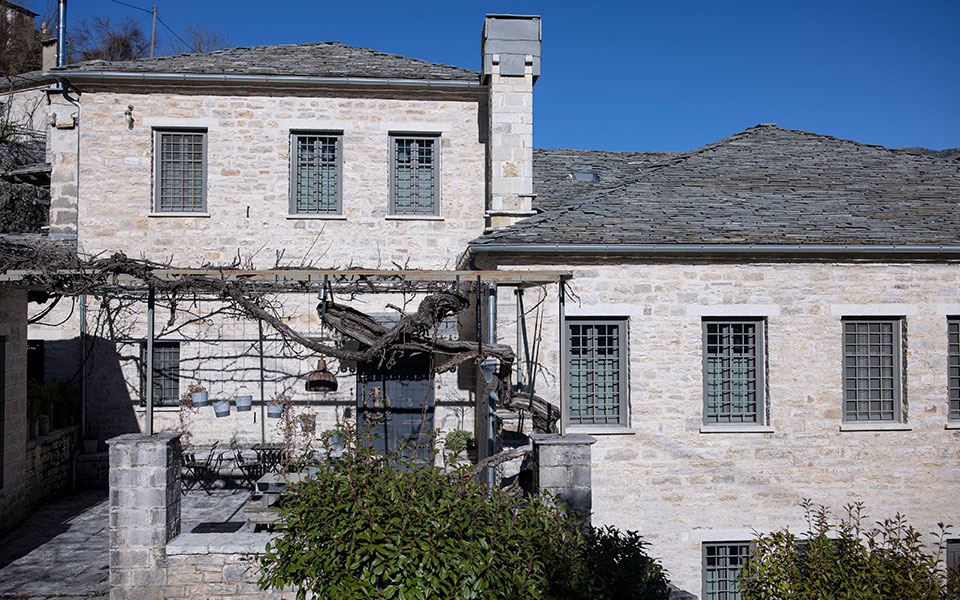
Apeiros Chora
© Dimitris Tosidis
The building that houses Apeiros Chora is thought to have been built between the late 17th and early 18th centuries, but the exact date is unknown. What we do know is that the building was restored in 1861, as evidenced by the commemorative plaque on its exterior wall. Apeiros Chora, which was built with local slate rock, pine wood, and fir wood by skilled craftsmen from the nearby region of Mastorochoria, was founded only a few years ago by George Kontouris, the building’s current owner (the building has been in his family for seven generations), and his wife Athina Aslanidou.
The home has six rooms (Green, Pink, Blue, Yellow, Brown, and Khaki), some of which have fireplaces, spread across two levels: the garden level and the ground level. Certain rooms have the capacity to accommodate a third or fourth bed, or they can be connected to form a single, spacious room with a kitchen and separate entrance that is ideal for families or large groups. The Purple Suite is another option; it features two rooms, two bathrooms, and furnishings for in-room breakfast.
Apeiros Chora, Kato Pedina, Ioannina, Tel. (+30) 26530.711.88, apeiroschora.gr. Double rooms with breakfast start at €200.
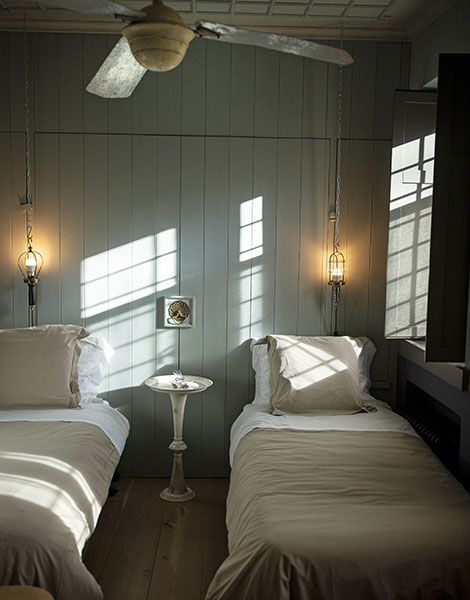
Comfortable beds, ceiling fan and natural light at Apeiros Chora, one of Zagori's finest guesthouses.
© Dimitris Tosidis
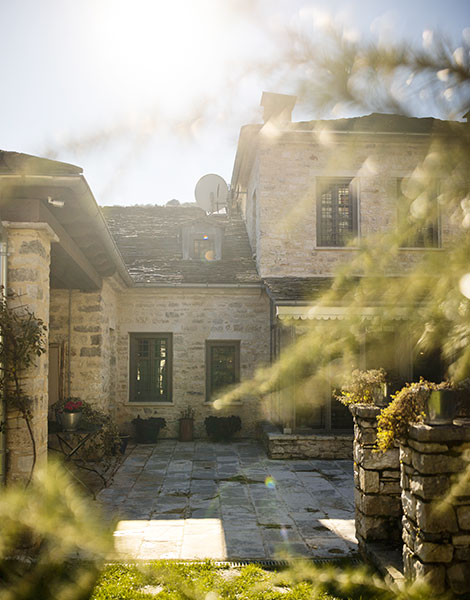
Apeiros Chora was built sometime between the late 17th and early 18h century.
© Dimitris Tosidis
The most intriguing aspect of Apeiros Chora, though, is how it looks more like a home than a guesthouse thanks to its numerous common areas, especially the kitchen, which has always been the heart of the building. The space also includes a lounge area, separate living rooms for the winter and summer, an entertainment area with board games, a PlayStation console, a chess board, and a bridge table (the area is soundproofed to allow guests to have fun without disturbing other guests), a massage room, a spa with a jacuzzi and hammam, a cellar that a previous generation’s family member had sealed off with mud to keep valuables hidden, and a bar where you can enjoy top-shelf labels like “Chrysi Vidra,” a locally produced aged tsipouro by Domaine Glinavos. During the summer, guests can also enjoy the courtyard and garden.
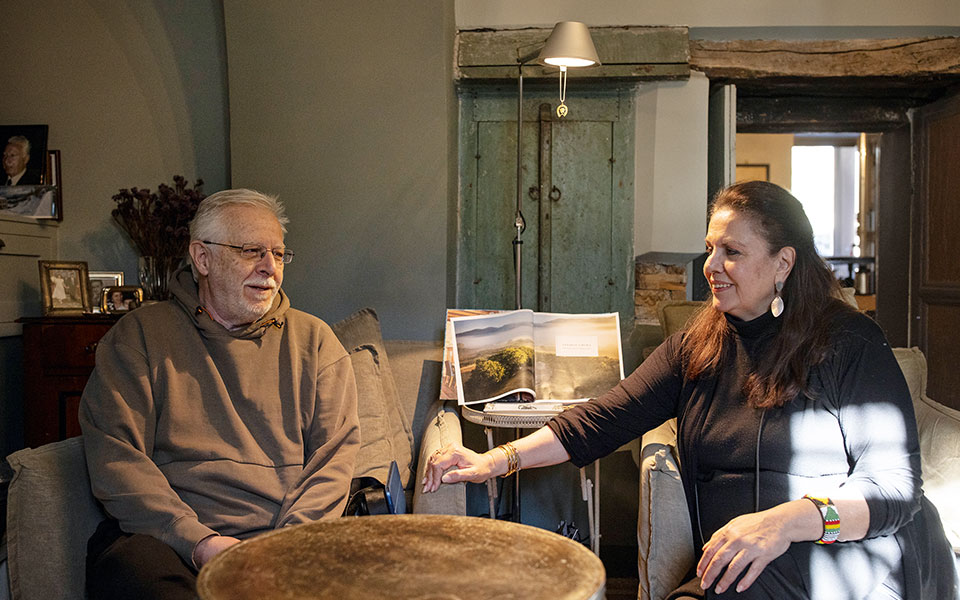
The hosts Giorgos Kontouris and Athena Aslanidou.
© Dimitris Tosidis
Every area of the guesthouse is different depending on its use, but there is a consistent style throughout, with modern and traditional elements coexisting harmoniously. Everything from the display case containing the wedding crowns from successive generations of the family to the proudly displayed flintlock musket over an embrasure, the chest from a great grandmother’s dowry, and the fustanella of a distant relative who was instrumental in rescuing Ioannina from the Ottoman empire are priceless pieces that straddle the line between ornamental pieces and historical artifacts, each with a unique tale to tell.
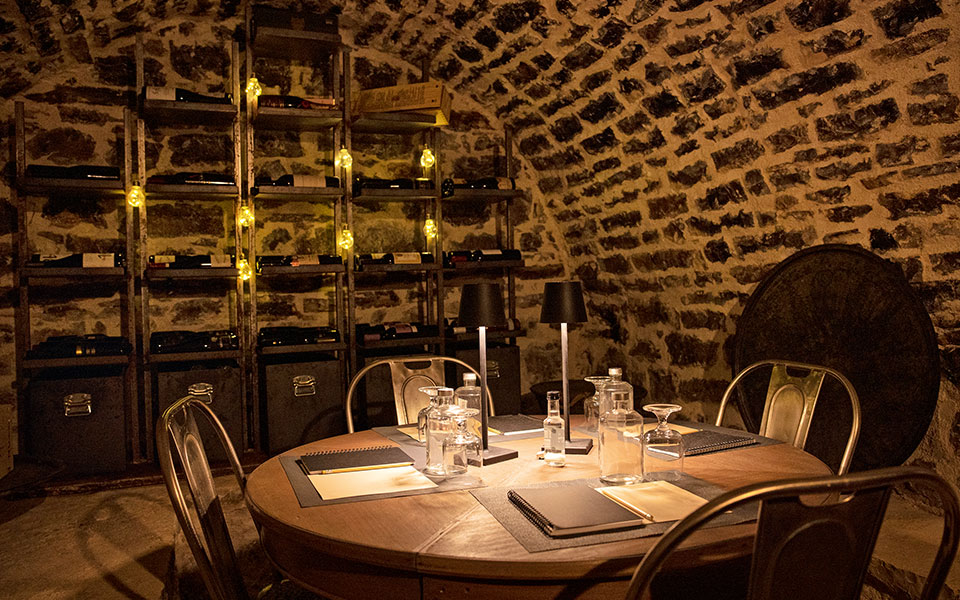
Wine tastings are organized in the cellar.
© Dimitris Tosidis
Apeiros Chora is a modern guesthouse with double-pane windows that reduce heat loss, energy-efficient LED light bulbs, a pellet boiler stove, and an old cistern from which George’s family used to collect cold water from the snow – a practice they still carry out today. The guesthouse is lovely, functional, and full of character, but there is another element that adds to a guest’s experience: the attention to detail in everything they do. Whether it’s an espresso, glass of wine, or shot of tsipouro, George and Athina are aware that everything has its time.
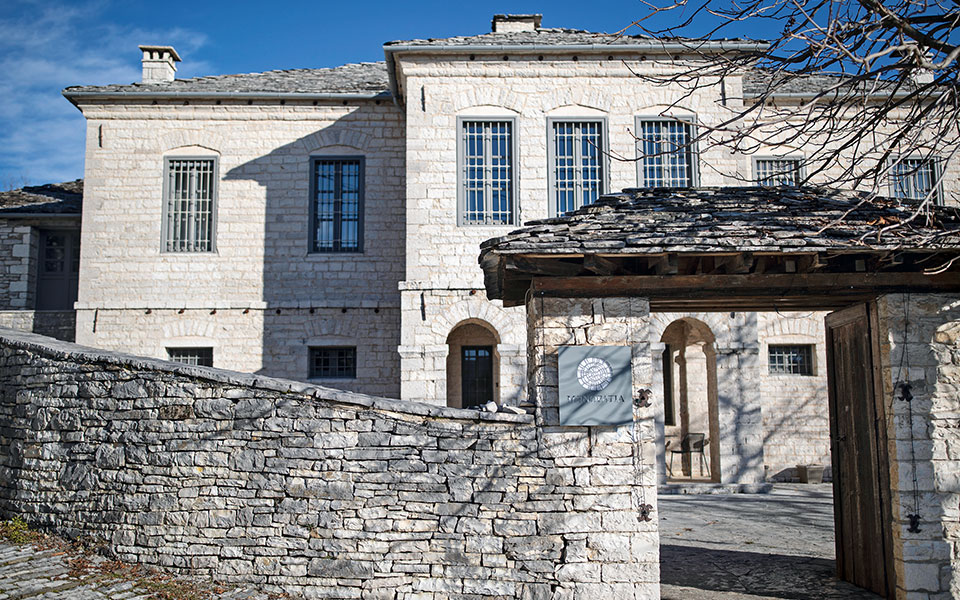
Monopatia Mountain Resort
© Dimitris Tosidis
With a single sentence, Paris Zografos, manager of Monopatia Mountain Resort, aptly describes the look and feel of a one-of-a-kind guesthouse whose interior, despite its location on the slopes of Mount Tymfi, evokes something different, urban, and slightly foreign: “When you are outside the guesthouse, it looks like you are still in Zagori. When you go inside, you’re not in Zagori anymore. The decor is out of keeping with the region’s typical design style.”
The guesthouse is housed in stone-built buildings characteristic of Zagori architecture, true jewels of Ano Pedina (or Ano Soudena in Slavic, which means “cold place”). “The main building is a palatial house that, even by today’s standards, would be considered large even for someone who is wealthy,” notes Paris of the main building, which was built in the nineteenth century. The ground floor serves as a breakfast area, while the upper level hosts events such as seminars, presentations, conferences, and creative workshops.
Monopatia Mountain Resort, Ano Pedina, Ioannina, Tel. (+30) 694.523.9500, monopatiaresort.gr. Double rooms with breakfast start at €125.
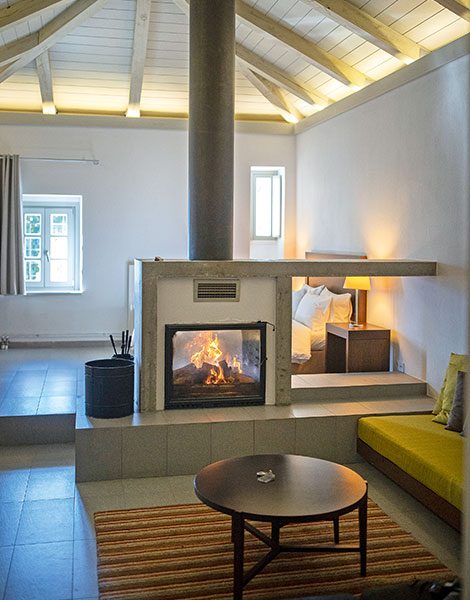
Studio with bedroom and living room with fireplace.
© Dimitris Tosidis
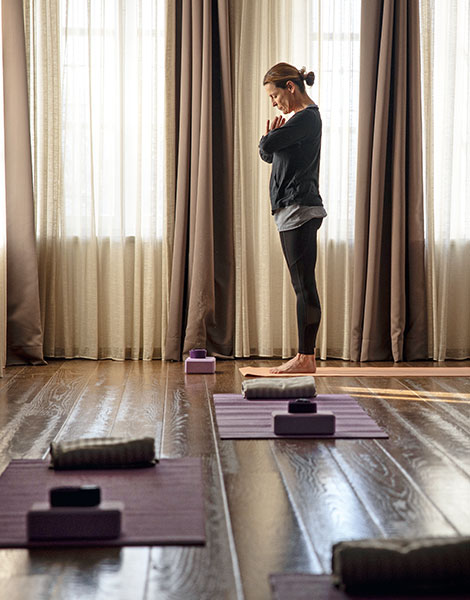
Monopatia hosts yoga classes.
© Dimitris Tosidis
The fifteen rooms, eight of which are studios, are housed in neighboring buildings that have been restored. The outbuildings where locals used to store their tools have been converted into accommodations, and the threshing floors are now used for yoga classes. Monopatia Mountain Resort is a living example of how a rural economy can be transformed into a tourist economy, as well as how a mountain village can become a top destination.
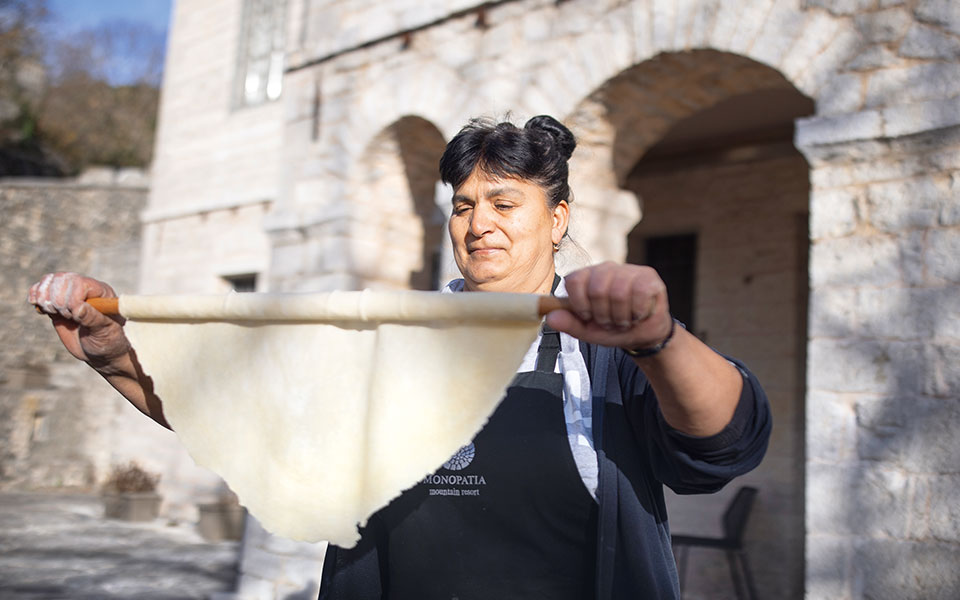
Xanthi has worked at the guesthouse since it first opened.
© Dimitris Tosidis
Today, the guesthouse is run by Paris, who spent years as an executive in multinational corporations before starting his own logistics company, and Chara, a cheerful person who enjoys keeping things neat and orderly and has a passion for ceramics and yoga. Xanthi, who has been employed at the guesthouse since it first opened, is essential to the operation of Monopatia Mountain Resort. She is in charge of preparing the guests’ breakfast and keeping the guesthouse clean. You’ll always find her there, no matter what the weather is like in Zagori, and she and her husband are an important part of the guesthouse staff.
Looking at the resort, one sees a guesthouse that has been designed in such a way that it invites you to stay indoors and enjoy a hot chocolate, coffee, or glass of wine or whiskey in front of the fireplace. Paris, however, who’s a fan of sports, encourages his guests to explore the outdoors, learn about local culture, and enjoy nature. Zagori’s unique ecosystem includes the famous Vikos gorge, stone-built arched bridges that blend into the natural environment, monasteries, watermills, trails, and steep, rugged rocks.
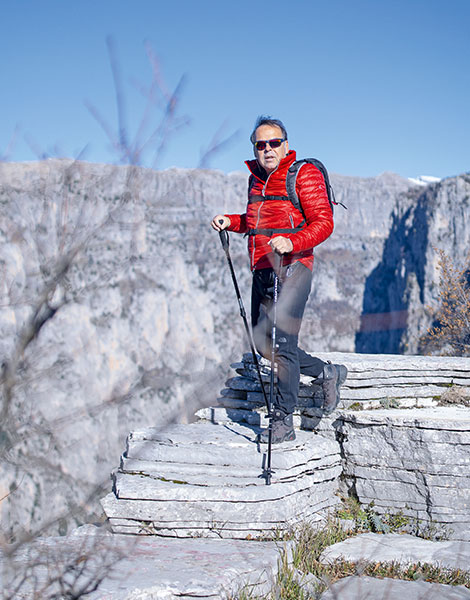
Paris Zografos, manager of the guesthouse, is a fan of the great outdoors.
© Dimitris Tosidis
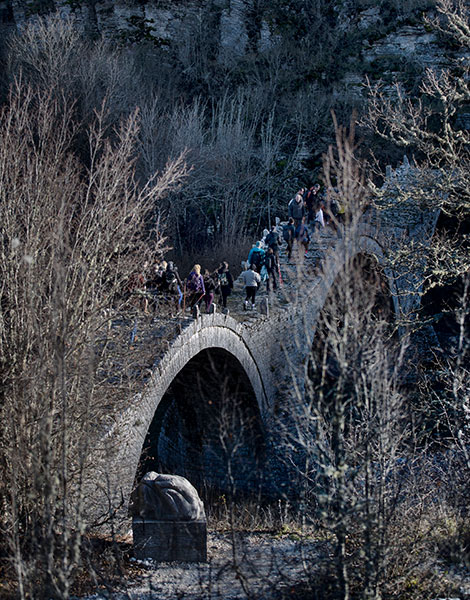
One of the many stone-built arched bridges in Zagori.
© Dimitris Tosidis
“In the plane forest, near the Voidomati river, is a lovely monastery called Spiliotissa. A grassy clearing nearby allows you to sit and listen to the river as it flows past. If you’re lucky and there’s a breeze, you can hear the leaves of the plane trees, and if you’re really lucky, you can hear birds.” The guesthouse’s team organizes yoga retreats, which Chara and many of the guests enjoy. Paris’ favorite exercise, on the other hand, is silent walking, which is ideal for dealing with today’s anxiety. Instead of everyone walking in single file, he leads groups of hikers to a spot in the forest where there is enough room to walk freely and look at the trees. He asks them to turn off their phones and walk quietly. “When I hear someone say, ‘I’m bored,’ I know we’re on the right track because it means they’ve disconnected from their daily life, emails, and obligations. Perhaps they didn’t know what to think about, which explains why they were bored. But they took the first step, so they are in the present moment, noticing what is around them and connecting with nature.”
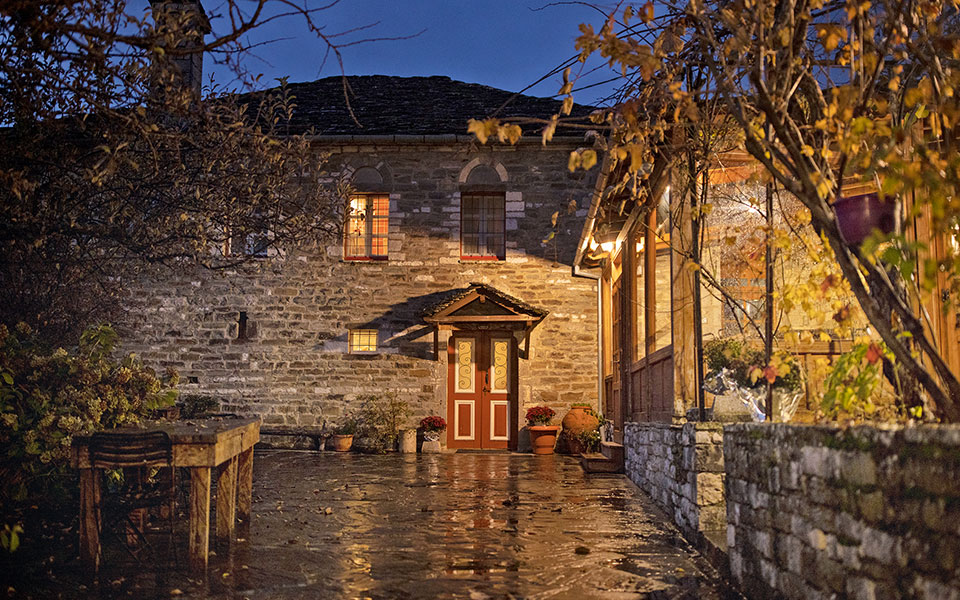
Dias Guesthouse
© Dimitris Tosidis
Kostas Tsoumanis purchased a 150-year-old house and a dilapidated outbuilding in Mikro Papigo in early 1990, before Zagorochoria became a popular tourist destination. “The buildings belonged to a family who owned a second house in Megalo Papigo. Everybody thought I was crazy. They would ask me, ‘What are you going to do there?’. At the time, Mikro Papigo was not very popular.”
Dias, Mikro Papigo, Ioannina, Tel. (+30) 26530.412.57, diaspapigo.gr/en. Double rooms with breakfast start at €75.
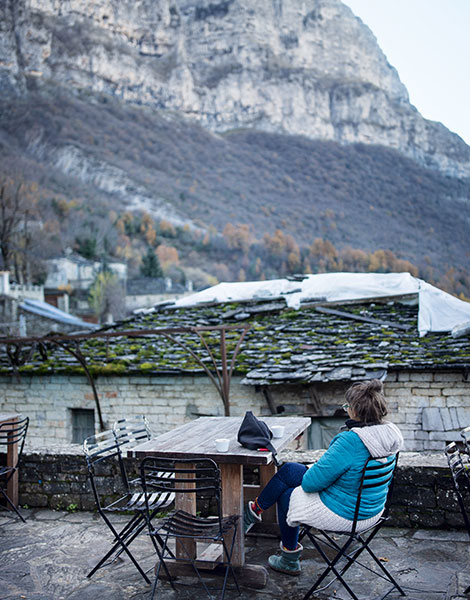
View of the imposing Mount Tymfi from the courtyard of Dias.
© Dimitris Tosidis
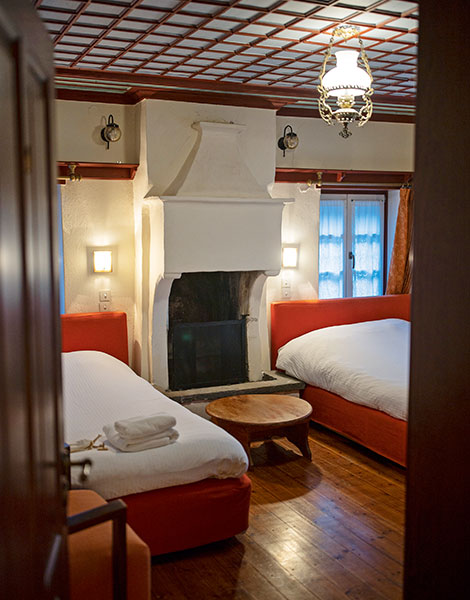
The rooms at Dias are decorated in a warm, minimalistic style.
© Dimitris Tosidis
Kostas built his guesthouse at an altitude of 1,000 meters, in a beautiful location, beneath the towering Astraka rock formations, and named it after a nickname he received as a child. “They used to call me Dias (Zeus) because I was good with a bow and arrow.” Kostas runs the guesthouse with his brother Tasos and the rest of the family. Dias is a popular destination for trekkers, who were among the first to support him and continue to do so today. Those who wish to visit the Drakolimni alpine lakes or hike up to the peaks of Gamila (2,497 meters) and Astraka (2,432 meters) of Mount Tymfi must first pass through Mikro Papigo. From April to October, tourists from all over the world visit this remote region of Greece, including Austrians, Germans, Swiss, Americans, Canadians, and Australians.
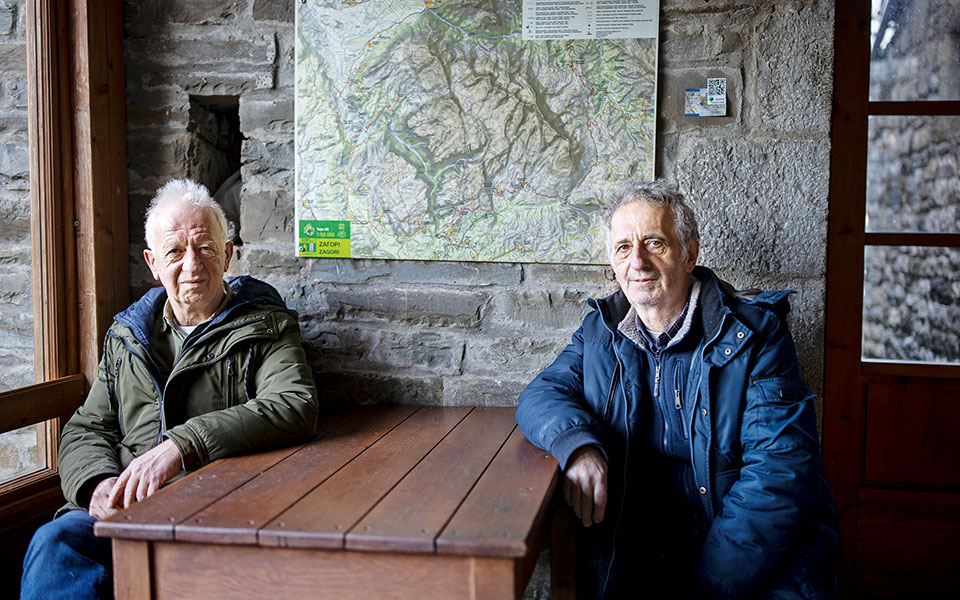
The Tsoumani brothers, Tasos (left) and Kostas or Dias (right).
© Dimitris Tosidis
Eleven double and triple rooms, each with a fireplace, wooden door and window frames, and vintage lamps, are tastefully decorated in a warm, minimalistic style. In other words, they make guests feel at home and welcome. The interior design, the carefully chosen furniture, the colors, the materials, and the way the rooms are arranged all adhere to the fundamentals of hospitality. Nothing more; nothing less.
Dias offers its guests more than just rooms with beds; it also provides them with the warm atmosphere of an intimate lodge. The guesthouse and restaurant are open year-round.
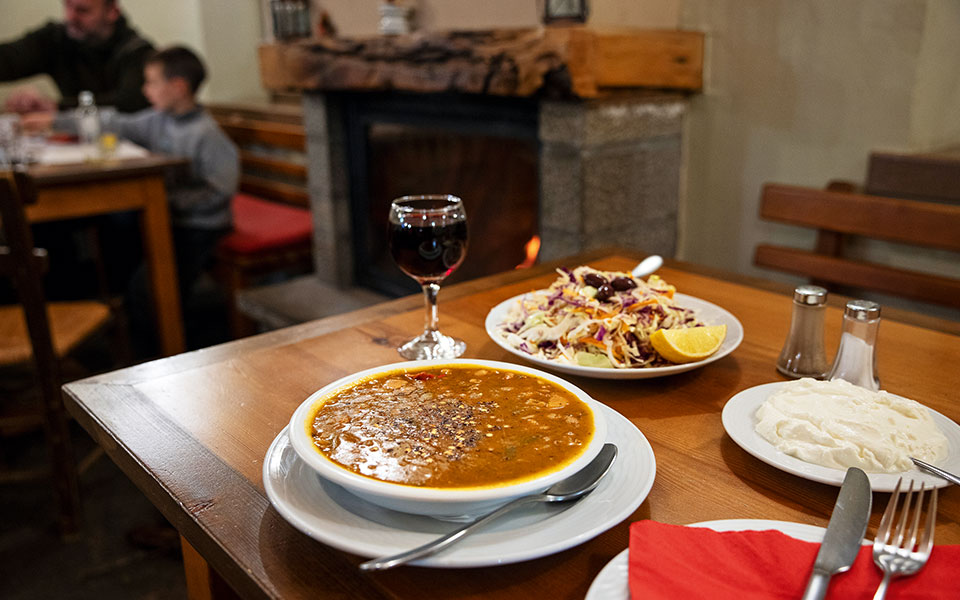
Bean salad with bukovo, politiki, chicken and wine at Dias' taverna.
© Dimitris Tosidis
Although Mikro Papigo is somewhat remote in comparison to other Zagori villages, with more rabbits on the road than cars at times, it is accessible during the winter. Aside from trekking and hiking, visitors can enjoy a variety of outdoor activities, including horseback riding, canyoning, and foraging for wild truffles and mushrooms during the spring months. Rafting, on the other hand, is a popular activity for both beginners and experts alike. The route starts at the Papigo Bridge and ends at the Kleidonia Stone Bridge, lasting little over an hour. Some companies, such as Papigo Adrenaline, organize various activities along the Voidomatis River, stopping halfway at a spring with an old mill to serve visitors mountain tea, biscuits, and rakomelo (an alcoholic drink made with raki and honey).
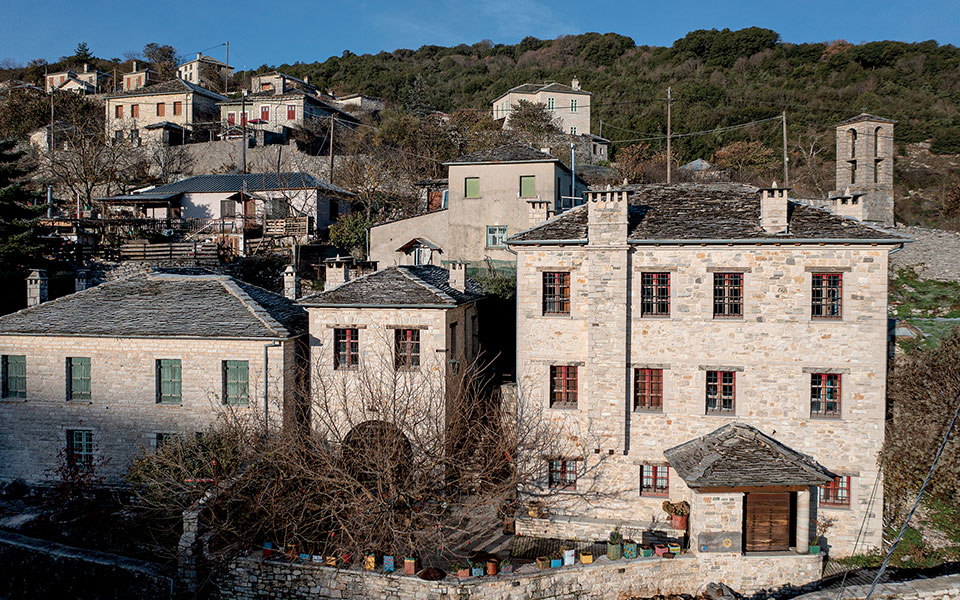
Anemi
© Dimitris Tosidis
Anemi is located in Kato Pedina, one of the villages of Zagori. Anemi, with its small size and cozy atmosphere, has won the hearts of its guests over the years as one of the region’s best guesthouses. Pavlos Sakkas and Lila Tsatsi founded Anemi after falling in love with Zagori long before it became a popular tourist destination. In fact, Pavlos, who is originally from Athens, has been visiting the region and trekking Mount Tymfi since the 1980s.
“There was an old house that had been abandoned for several years. We purchased it, along with the family’s old cookhouse, a small building with an oven inside that now serves as the guesthouse’s kitchen. Anemi first opened its doors in 2014, and this year marks its 10-year anniversary. The guesthouse has only seven rooms with names like Rodani (Spinning Wheel), Tylichtra (Reel), Adrachti (Spindle), and Saita (Shuttle), which show a passion for traditional weaving. Some of the rooms feature mostly wood or stone, while others have been painted in shades of yellow, green and dark blue. “When we bought the house, we decided to keep the colorful rooms, which is typical feature of Zagori,” notes Pavlos. Flokati rugs, floral-patterned pillows, low couches, and wooden door and window frames round out Anemi’s style.
Anemi, Kato Pedina, Ioannina, Tel. (+30) 26530.720.03, anemi-zagori.gr/en. Double rooms start from €90 with breakfast. Double rooms start at €90 with breakfast. The evening menu is served Friday through Sunday and is also available to non-guests. For reservations, please call (+30) 694.061.5606.
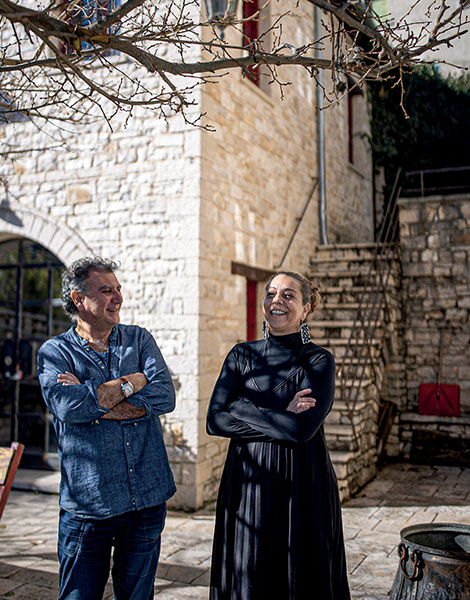
Pavlos and Lila opened the guesthouse in 2014.
© Dimitris Tosidis
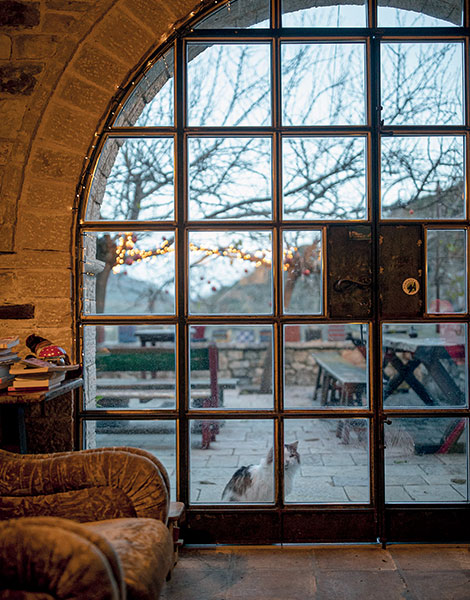
The glass window of the living room, where breakfast is also served.
© Dimitris Tosidis
Unquestionably, the guesthouse’s most appealing and welcoming room is the old cookhouse with its two levels – the kitchen on the upper level and the sitting room on the lower level. Unquestionably, the most appealing and welcoming room in the guesthouse is the old cookhouse, which has two levels: the kitchen on the upper level and the sitting room on the lower level. You can enjoy a delicious breakfast at the large wooden table, relax after a long day of rafting on the Voidomatis River or hiking along Zagori’s trails, and chat with the other guests.
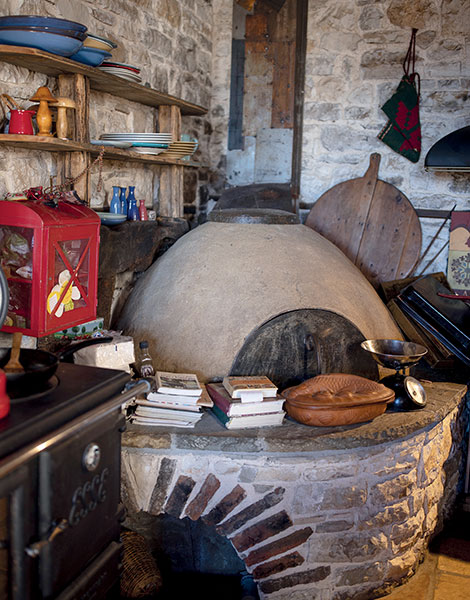
Anemi's heart beats in the kitchen.
© Dimitris Tosidis
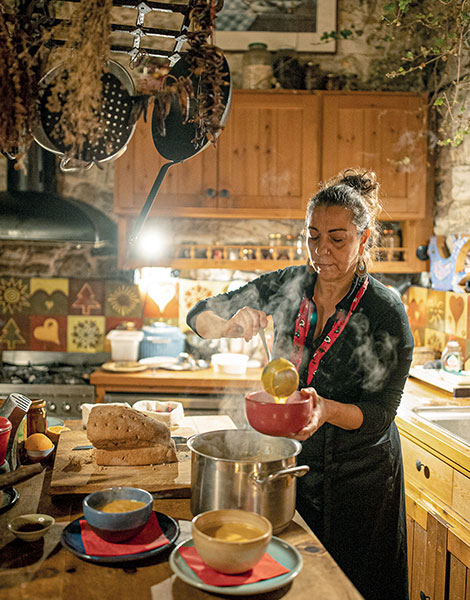
The food at Anemi is incredible.
© Dimitris Tosidis
Breakfast at Anemi is unforgettable, with no set menu but a variety of interchangeable flavors. The day we stayed, they served eggs sunny side up with tomato sauce and toasted bread, caramelized onions, mushrooms, galotyri (a soft and creamy sheep’s milk cheese), olives, and greens, as well as a sweet plate of pancakes with powdered sugar and orange slices.
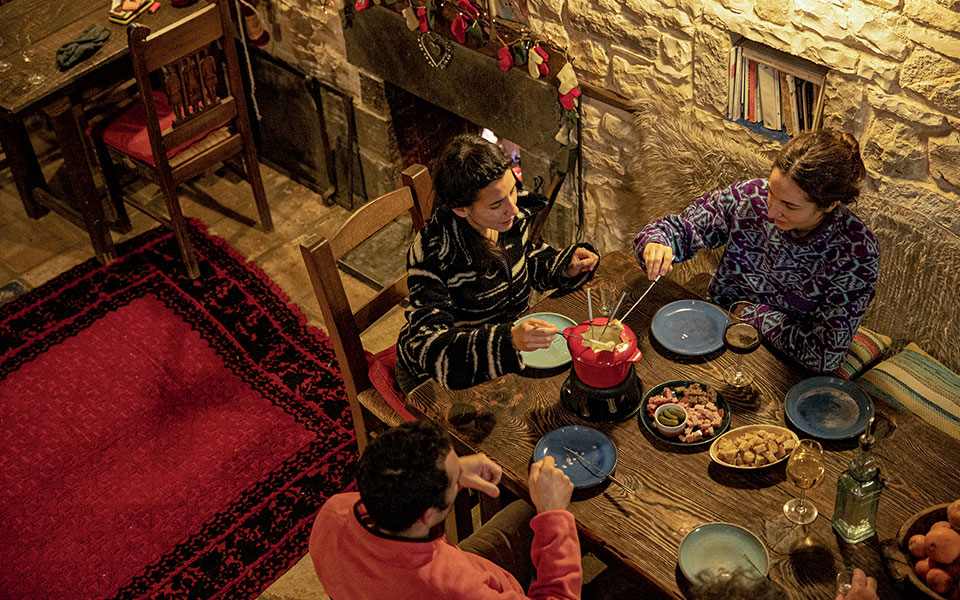
Fondue tasting with local cheeses, Epirus tsipouro and Debina wine.
© Dimitris Tosidis
This winter, Anemi introduced a new menu that includes a different soup every time, a cold dish with local Epirus sausages, fondue made with local cheeses, local tsipouro, and a white Debina wine, burgers with Ano Pedina meat, and homemade sauces such as ketchup, mayonnaise, and a barbeque sauce, complemented by a tsipouro-based cocktail – the one we ordered was made with aged tsipouro, mountain tea, a slice of orange, and black sugar.
Whether it’s the charming town of...
Four guesthouses set in unique landscapes,...
From Crete to Olympus, hike the...
How Metsovo thrives against the odds...